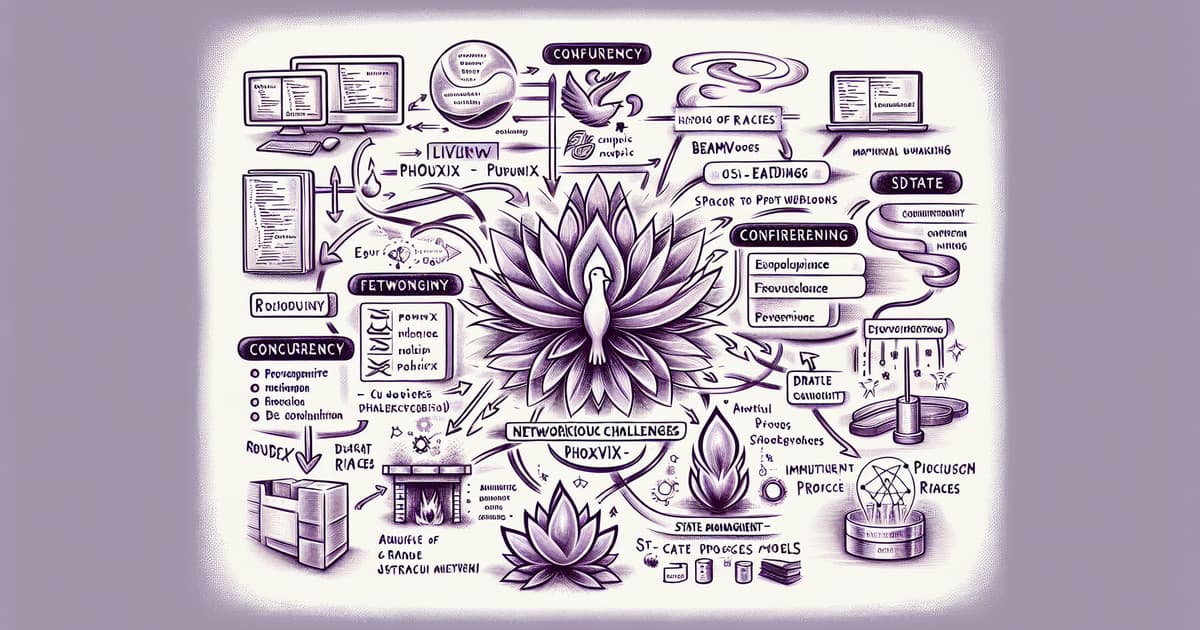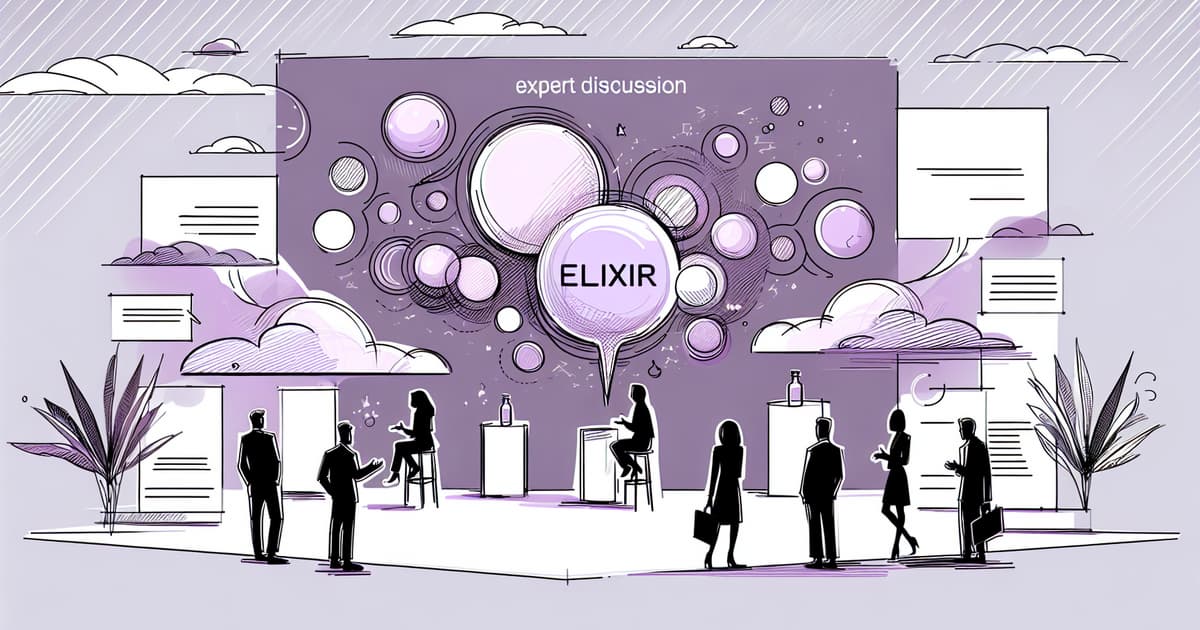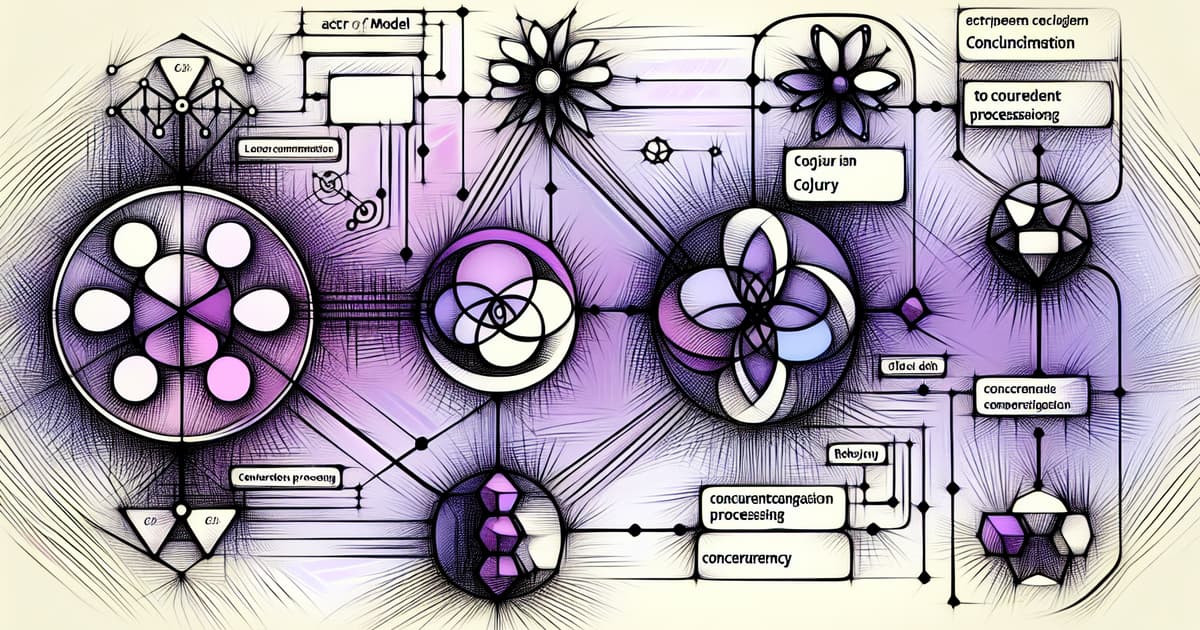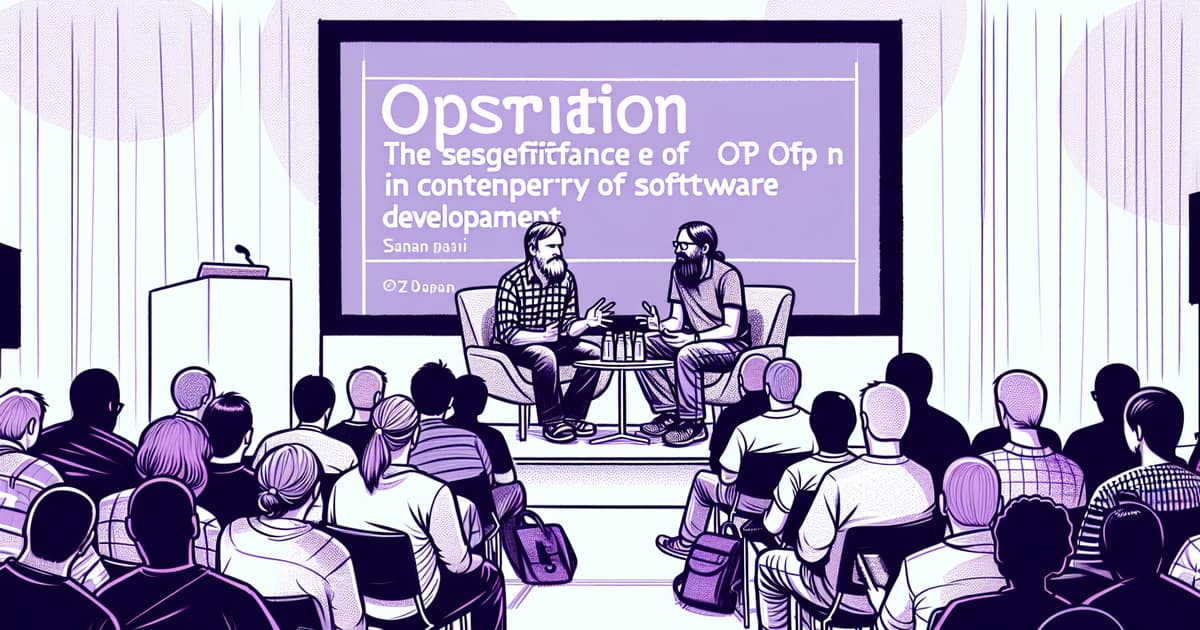We can't find the internet
Attempting to reconnect
Something went wrong!
Hang in there while we get back on track
Concurrency

Elixir's proven capability in handling concurrent and distributed systems underpins many enthusiasts and experts' discussions. From web development with Phoenix and LiveView to handling networking challenges on the BEAM platform, Elixir manifests its strengths in various domains—precisely, concurrency infuses Elixir with versatility that applies to tasks ranging from real-time strategy games to handling TCP connections and building fault-tolerant systems. With platforms like LiveView, developers find a good balance of functionality and enjoyability in Elixir for complex applications. Elixir’s ecosystem also includes powerful tools such as Cachex for caching and Mint for HTTP requests—a testament to its growing library of resources.
Performance optimization is a key aspect within Elixir's domain. Insights into improving CPU performance and the architecture of BEAM illustrate Elixir's suitability for network applications and performance-critical tasks. Security is also a fundamental concern in software development, and Elixir addresses it head-on through its design that promotes safe concurrency and guards against data races. Strong concurrency primitives in Elixir, such as gen_statem and tasks, empower developers to build asynchronous workflows and manage state efficiently in their applications, thereby enhancing the robustness and scalability of systems.
Among advocates of Elixir is a shared recognition of the programming language's utility in diverse applications such as machine learning, mobile app development, and even traditionally difficult problems for the BEAM. Storytelling principles like 'Do Fun Things with Big, Loud Worker Bees' help developers grasp the core concepts embodied in Elixir's mental model. The language's growing machine learning ecosystem further symbolizes a ripe moment for developers to transition their projects to Elixir. Meanwhile, LiveView continues to push the boundary of real-time interactivity, with developers finding new ways to handle asynchronous operations within the Phoenix framework. Developers further appreciate Elixir's advantages in creating transactional systems with intrinsic fault tolerance and real-time processing capabilities.
A number of notable content creators, including José Valim, the creator of Elixir, emphasize the importance of education and the untapped potential of the BEAM, encouraging exploration beyond current applications. Valim's work on Livebook, a computational notebook for Elixir, integrates code, documentation, and visualizations—all achievable within a reproducible and functional programming environment. The principle of immutability, along with Elixir's process model, fosters a strong foundation for developers learning and working with the language. Conversations and knowledge-sharing within the community persist as key methods for unveiling the full potential of Elixir's concurrency model, as observed in various conferences and discussions among practitioners and experts within the ecosystem.

Growing BEAM Ecosystem Through Phoenix LiveView
Sophie DeBenedetto discusses the impact of Phoenix LiveView on broader adoption of the BEAM ecosystem.

Guide to Creating ETL Pipelines Using Elixir and GenStage
Osman Perviz explores the use of Elixir's GenStage for creating efficient concurrent ETL (Extract, Transform, Load) pipelines, highlighting Elixir’s asynchronous capabilities and the benefits of GenStage over traditional single-threading and multi-threading approaches.

Discussion with Gleam Language Core Team
The BeamRadio episode features a discussion with Gleam's core team members Louis Pilford and Hayleigh Thompson.

In-depth Guide to Elixir GenServer Functionality
An extensive guide on GenServer, a behavior module in Elixir for creating concurrent, stateful processes based on the Erlang OTP framework.

Inquiry into the Term 'Actor' in Programming
Jimmy_Trouble is curious about the origins and reasoning behind the term 'actor' in the context of the actor model.

Improving Elixir Application Performance with Cachex Caching
Allan MacGregor discusses the benefits of caching in Elixir applications and introduces Cachex, a powerful caching library for Elixir.

Expert Discussion Unpacking Elixir's Potential
Sophie DeBenedetto and Andrea Leopardi discuss the capabilities of Elixir, including web development with Phoenix LiveView and networking solutions on the BEAM platform.

Overcoming Global State in Tests with Localized State for Async Elixir ExUnit Tests
JB Steadman discusses strategies to avoid using `async: false` in ExUnit tests by localizing global state, allowing tests to run asynchronously and independently.

Understanding the High-Level Overview of OTP in Erlang
This article offers a comprehensive overview of the high-level aspects of the Erlang/OTP architecture and how it enables the development of stable and scalable systems.

Asynchronous Processing Techniques in Phoenix LiveView
Berenice Medel discusses how to handle asynchronous processing in a LiveView using Elixir's concurrency features provided by the Task module.

Exploring the Full Potential of the BEAM Runtime
In a discussion at Code BEAM Europe 2023, Lars Wikman interviews both Saša Jurić, author and advocate for the Elixir programming language, and José Valim, the creator of Elixir, to discuss the untapped potential of the BEAM virtual machine. They explore what the community could be doing beyond the current applications and utilize the BEAM more fully.

Examining the Synergy Between Transactional Systems and Erlang/Elixir Technologies
Lee Sigauke discusses the natural fit of Erlang and Elixir for transactional systems and their inherent advantages such as fault tolerance and real-time processing capabilities.

Development of the ElixirConf Chat Application using LiveView Native
Cynthia Gandarilla outlines the journey of creating a chat application for ElixirConf 2023 using LiveView Native, showcasing the technology's ability to save time and money in mobile app development.

Understanding Process Communication in Elixir
Alvise Susmel explains the fundamentals of message passing in Elixir, comparing it with the shared memory concurrency model in other programming languages.

Understanding and Utilizing GenStage for Twitter API Consumption
This article explains the concept of GenStage, its components, and how to use it to consume the Twitter API continuously. GenStage is an Elixir behavior that allows you to create a data-flow pipeline consisting of Producers, Consumers, and Producer-Consumers, each having specific roles in processing or passing along data. The article demonstrates how to build a GenStage application that persistently fetches tweets mentioning a certain topic from Twitter and discusses patterns, concurrency, and back-pressure management within the GenStage framework.

Utilizing ExUnit for Streamlined Temporary Directories in Tests
German Velasco presents an efficient way to manage temporary directories in tests using ExUnit's built-in functionality.

Performance Discrepancy of Elixir Flow between Ubuntu and Windows 10
AltInnateEgo is experiencing unexpected behavior when using the Flow library in Elixir on Windows 10, as opposed to Ubuntu. The code in question performs a port scan and processes the response data, but on Windows, it executes slower and in chunks with delays between each.

Debugging An ETS-Based Sensor Simulator in Elixir
hezwat is exploring how to use Elixir's ETS for sensor data simulation and encounters unexpected early termination in their code. They seek assistance in debugging and possibly salvaging the code.

Understanding Elixir's Full Stack Capabilities
Lars Wikman presents on the capabilities of the Elixir programming language and the Phoenix web framework for building web applications. He discusses the advantages of Elixir, such as developer productivity, performance, reliability, and observability.

Exploring Livebook and Computational Notebooks in Elixir
José Valim, creator of Elixir, shares insights on Livebook, a computational notebook for Elixir, emphasizing the integration of code, documentation, and rich visualizations within a functional programming environment. In his Lambda Days 2023 presentation, Valim highlights the importance of immutability in Elixir and how this trait, along with the process model, enables reproducible workflows in Livebook.

Overview of the Elixir Programming Language's Popularity and Features
Szymon Soppa offers a comprehensive guide on the Elixir programming language, explaining its creation, features, and benefits in the context of modern programming needs.

Comparing Actor Model and Concurrency in Elixir, Clojure, and Ruby
In this episode, Xiang Ji and Nathan Hessler discuss with Sundi and Owen about the actor model and concurrency in Elixir compared to Ruby and Clojure, and what this means for technology stacks.

The Impact of Data Transfer on Performance in Elixir's Task.async
Tobias Pfeiffer discusses the performance implications when using Elixir's Task.async with large data transfers between processes.

Implementing Repeatable Read Isolation in Ecto
Chris Keathley shares insights on setting the isolation level in Ecto transactions to handle race conditions.

Community Advice on Learning Elixir
Dry-Conflict-7008 seeks advice from the Elixir community on effective ways to learn Elixir, including resources and strategies.

Erlang's Role in Learning and Using Elixir for Programming
Author hezwat inquires about the necessity of learning Erlang for Elixir programmers and seeks guidance on the learning path to use Elixir professionally.

Troubleshooting Variable Scope with Elixir Actors
hezwat discusses challenges and a solution related to variable scoping within an Elixir actor implementation.

Securing Sensitive Data in Elixir's GenServers
Gabriel Pereira discusses the importance of protecting sensitive data within Elixir GenServers and introduces methods to secure such data.

Case Study on Approximated.app - A Web App Domain Automation Tool Built with Elixir
Carter shares the experience of building and running Approximated.app with Elixir, managing over 200k custom domains and its performance in production.

Announcement of Elixir v1.15.0 Release
The Elixir community announced the release of Elixir v1.15.0, which focuses on compilation and boot times improvements.

Elixir's Practicality and Potential Beyond Web Development
Jason Stiebs touched on the practicality and power of Elixir, especially for web development and beyond. He recognized Elixir's leverage as an efficient, production-ready language with a solid ecosystem including Phoenix and observed a relative stability in his tech stack over years. He advocated for exploring Elixir's capabilities outside the traditional web domain, citing examples from machine learning to 3D modeling.

Optimizing Map Performance with Elixir and Leaflet.js
Aziz Abdullaev discusses a practical approach to optimizing the performance of a map in a web application using Elixir, Phoenix LiveView, and Leaflet.js. The author details the issues encountered when attempting to render over 12,000 map markers and how they solved these challenges.

Discussing Elixir's Educational Path with Saša Jurić
Saša Jurić, the author of 'Elixir in Action', speaks about the progression and challenges in training and education for Elixir developers.

Travel Platform Transformation Using Elixir
Kimberly Erni shares insights on using Elixir for TravelPass Group's travel platform transformation.

Overview of the Elixir HTTP client Mint
Eric Meadows Jönsson presents Mint, a novel HTTP client for Elixir, which supports both HTTP/1 and HTTP/2. Mint features a process-less architecture that uses pure data structures.

Ambivalence Towards Elixir's Distributed System Capabilities
Software developer Aaron Harpole discusses his experiences with the Elixir programming language, focusing on its capabilities for building distributed systems and areas he believes could benefit from improvement.

Concurrency in Go and Elixir: A Comparative Study
Anna Neyzberg and Hannah Howard present a detailed analysis of the concurrency features offered by Go and Elixir.

Understanding Process Potential for Concurrency and Fault Tolerance in Elixir
Meryl Dakin discusses the power of OTP in Elixir for enabling multitasking and fault tolerance within applications. She presents a practical example of an app that deploys lessons to Github repositories to showcase how OTP's concurrency tools can help developers efficiently manage tasks, maintain global state, and ensure reliability, even for those transitioning from object-oriented programming backgrounds.

Debate on OTP's Role and Evolution in Elixir Software Development
Dave Thomas, with counterpoints from Brian Mitchell, explores the topic of using OTP (Open Telecom Platform) in modern software development within the Elixir ecosystem.

Structured Program Design in Elixir with Bruce Tate
Bruce Tate speaks about layered program design in Elixir, emphasizing the mental model of 'Do Fun Things with Big, Loud Worker Bees', which represents the concepts of Data, Functions, Tests, Boundaries, Lifecycles, and Workers.

Elixir for Real-Time Strategy Games in Space
Julian Doherty discusses the challenges and design patterns in building a real-time strategy space battle game with consideration to the speed of light as a gameplay factor.

Leveraging Workflow Graphs for Efficient Concurrency in Elixir
Zack White discusses a method for managing workflows in Elixir using directed acyclic graphs (DAGs) to improve concurrency and runtime flexibility.

Elixir's process management and the $callers and $ancestors features
Isaac Yonemoto discusses Elixir's secret features $callers and $ancestors and their role in process management.

Exploring High-Dimensionality in Language Design
Brooklyn Zelenka discusses innovative approaches to language design, advocating for the creation of small, composable DSLs and structured languages to simplify coding complexity.

Understanding Networking on the BEAM with Elixir
Andrea Leopardi presents insights into how the BEAM's architecture is particularly suited for network applications. He discusses the handling of TCP connections and the design patterns for building scalable and fault-tolerant systems.

Introducing ECSx for Game Development with Elixir
Andrew Berrien introduces 'ECSx', a new framework for developing real-time games and simulations in Elixir, leveraging OTP's strengths.

Exploring Concurrency in Elixir with The Actor Model
Lars Wikman provides an in-depth look at The Actor Model as it pertains to Elixir and the underlying BEAM VM, debunking the terminology's use in Elixir while covering processes, message passing, GenServers, and architectural patterns.

Securing Software with Elixir: Business and Technical Insights
Michael Lubas discusses the importance of security in Elixir software development, including how the language's design promotes safe concurrency and prevents common vulnerabilities like data races.

Understanding Elixir Enum and Stream Modules
Brewing Elixir introduces key concepts of Elixir's Enumerable and Collectable protocols and illustrates how to efficiently work with collections using Enum and Stream modules.

Kafka's Role in Scaling Backend Services and Team Structure with Elixir
Jeffery Utter discusses how the team at theScore scaled their backend services and teams using Elixir and Kafka at ElixirConf 2023. He highlights the benefits and tradeoffs of using Kafka, including enabling autonomous and decoupled teams, and provides insights into the social, organizational, and technical implications of using Kafka in an organization that heavily utilizes Elixir.
© HashMerge 2026